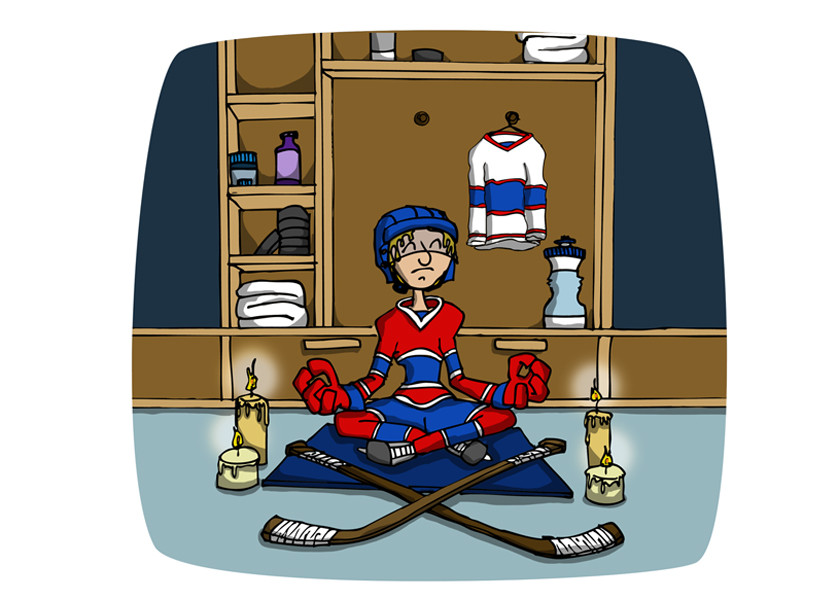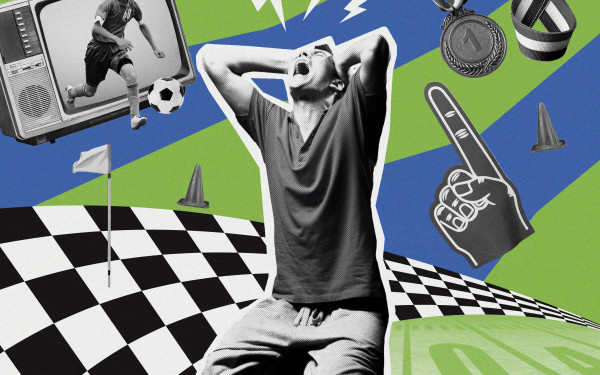Ritual Psych-rifice
The Difference in Your Game Might Be in Your Head
Mike Deboever believes he wouldn’t perform as well if he didn’t complete his pregame ritual 15 minutes before swimming competitively.
“I would be sitting down in the showers. Showers off. Lights off. With my left hand I would be playing with my goggles, flipping them like coins, and I would visualize the race,” said Deboever, owner and personal trainer at the Reebok Crossfit YUL gym in Dollard-des-Ormeaux. “And I would listen to music—always the same [song].”
Deboever would even load different race-starting beeps to his mp3 player just so he could react to the start in his mind.
“They do this with horses at horse races. They ring the bell, so the horse just reacts to that one sound. I worked like that too.
“I needed time to visualize. I needed to see how fast I would do the turns, I needed to know what athlete was in the race with me, and I needed to beat that person in my head first.”
Superstitions like these are now all too common for amateur and professional athletes, and some sports psychologists are even saying mental toughness is more important than being physically prepared.
Pittsburgh Penguins forward Sidney Crosby likes to wear the same hat and pads throughout the season. Phoenix Suns point-guard Steve Nash takes a two-hour nap, and Rafael Nadal takes freezing cold showers prior to a game.
Eric Saulnier, a trainer at Saint-Laurent gym, says the most unusual ritual he’s heard of involves a football player flicking a rubber band to get himself psyched.
“[This gym member] used to listen to a certain song that would get him pumped up for the game. He would ask his psychologist, ‘How could I make that happen on the field?’”
The psychologist suggested a scenario right out of the playbook of famed behaviourist B.F. Skinner. Whenever he started a heavy set at the gym, the football player would snap the rubber band on his wrist, start the song, and begin the set with all his might.
“On the field you can’t play that music, but you can still have that elastic band,” said Saulnier. “So [he would] snap it at important plays, when he knew he really had to perform.”
Rituals like this have become more detailed and meticulous, according to sports psychologist Lior Doron. He says they make athletes mentally tough by reliving good feelings they previously had when performing well, which are brought back up when the ritual is reenacted.
Doron’s worked with the Concordia Stingers soccer and football teams before, and said being mentally prepared through pregame rituals and superstitions allows athletes to feel comfortable.“Routines guide athletes to success. It soothes them and gives them more confidence,” said Doron. “Overall, it is good to have routines; it’s part of the success formula.”
That being said, it’s important not to let the routine become too important.
“You have to respect the guidelines [when it comes to] a routine. Have it in your control, make sure you’re not dependent on it, and have the mental toughness to be able to rebound back once your routine is set off.”
This mental toughness comes through work done away from the field of play. Doron teaches athletes in a classroom environment to build confidence, so when bad events happen on the field, they have resilience to get up, restart, and compete without getting mired in their thoughts.
“It’s like lifting weights,” said Doron of his mind exercises. “You start off small and then lift more and more.”In his class there’s a lot of reading, writing and discussions on how an athlete prepares and competes. He gives hints on how to perform in key scenarios, like making basic plays. Where one player might make a perfect pass in practice, in a more pressurized situation, another might drop the ball.
“These players know how to do it; they’ve done it thousands of times,” said Doron. “They’re working on their mental toughness. You can’t just read a book and become mentally tough.”
Doron says mental imagery is key—when an athlete encompasses all senses of game play in their mind, playing 30-second mental clips, rehearsing successful plays, mundane plays, and even failures, like Deboever would do before swimming.
He says being mentally prepared is 95 per cent of the game, and money is being wasted building better facilities for athletes, where they could improve more in a classroom setting.
“What’s undervalued in 2011, and in Canada, is the sports psychology component to playing,” said Doron. “It’s all mental. All athletes are very agile, quick, fast, and strong, but psychologically, the toughest mentally is usually better.”
For a free sports psychology e-learning course, visit flowinsports.com . Fill out the free initial request form by December 1, 2011 and mention “The Link.”


_600_832_s.png)


_copy__600_375_90_s_c1.jpg)
__600_375_90_s_c1.jpg)